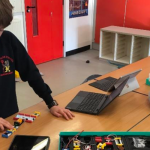Do you want to share ideas for a brighter future with young people? If you are an enthusiastic teacher, scientist, technologist or explorer with a background in either STEM+A or sustainable development, here is an opportunity as a content creator for Twin Science that might be right up your street. The role is both utterly flexible and highly rewarding.
Learning through Play
Teachers love to impart information. Providing knowledge through inspiring lessons, assessing pupils’ work and collaborating with other staff is what they do day in and day out. Many young people find it difficult to concentrate for a full hour in the classroom with all its distractions, but learning through small videobits of online interactive content can really engage them. On our rapidly changing planet, in addition to learning curriculum content, ideally all children should learn skills such as critical thinking and problem solving alongside developing a sense of self as a global citizen.
Sometimes it’s easy to believe kids play online games for too long. Hours in front of a screen shooting aliens, dodging busy roads or gathering gold can’t be particularly good for either their mental health or their education. However, Twin Science is using the attraction of electronic games to develop STEM+A competence and social conscience in young people. According to a world expert, Lego®, there’s a wealth of science to support the benefits of learning through play; children are born to learn through play, they should be in charge of their play and they learn best from experiences that are joyful, meaningful, actively engaging, iterative and socially interactive.
The Twin App
The Twin App is filled with educational games, quizzes, challenges and interactive videos called ‘Discovery Bits’; the App is already inspiring young minds with around 50,000 downloads. It brings together content on STEM+A combined with the UN’s Sustainable Development Goals (SDG) in an entertaining & engaging format. The content creators are passionate about their expertise areas introducing real-life problems related to social and environmental issues together with the solutions that can help solve them. This approach feels like it will be a big part of the future of education.
STEM+A Content
The school curriculum is often lacking in climate and sustainability education but teachers and STEM+A enthusiasts can use EdTech to share their solutions to the complex challenges young people face now and in the future. The Twin App leads children, aged 7 to 12, to construct knowledge themselves through interactive, inquiry-based activities, rather than having them passively consume the knowledge. Content must be relatable to the user, for example, using Lego® bricks to explain coding or promoting an understanding of pulleys to enable children to appreciate how gravity batteries can be used as a source of clean energy.
At the end of each Discovery Bit, recommendations can be added linking to similar videos or experiments and project ideas that allow kids to apply their knowledge in a practical, hands-on way. The possibilities for this STEM4Good content linked to the curriculum are near endless, from nanomaterials to renewable energy or the protection of endangered animals to polar exploration for climate research.
Education for sustainability
There are important issues which are really not covered in the national curriculum; from soil science and food resilience to sustainable transport and reduced consumption. Without a real understanding of these issues, we can not assume individuals will willingly make the necessary decisions to move towards a more sustainable way of life. Many aspects of life are interdisciplinary, blurring the edges of the curricular subjects.
The Twin solution is to teach children using the aims of the United Nations Sustainable Development Goals (SDGs) to ensure learning is relevant and engaging, inspiring children to become creative and curious problem solvers who can think about the big picture and find innovative solutions to the world’s issues. Global learning also helps cover social and emotional skills such as empathy or social responsibility. The aim is for all Discovery Bits to link to at least one of the SDGs from the first, No Poverty (SDG1) to the last, Partnerships for the Goals (SDG17). The videos can even link to the use or application of a product of a Tech4Good company such as a portable water test kit which would link to Clean Water and Sanitation (SDG6). If you are not yet familiar with the SDGs, help is at hand from Twin or in the Education for Sustainable Development Goals Learning Objectives by UNESCO.
Questions, questions
The App is focussed on student-centered learning to develop hard skills such as programming or analysis, soft skills including communication and critical thinking and personal values such as resilience, empathy and curiosity. But we also need to keep children engaged and assess their learning. All educators like to ask questions, it ensures the people they are talking to are listening. Embedded in each Discovery Bit are questions that require a response to encourage children to think and link concepts. The scripts allow for different types of questions and answer combinations; from multiple choice, to clickable images to surveys, these are what make the videos so sticky.
Got an idea?
If you think you have something to share with young people, Twin would love you to help build their database of content for the App. Given the lack of climate and sustainability education within many schools this seems like a real opportunity to raise awareness of these serious issues but, most importantly, that there are solutions to the challenges we face.
With a bit of training you could produce a Discovery Bit like this one on generating electricity with gravity (it was the first one I made so no laughing please, my own skills at content creation are still improving).
Even if you don’t have an idea yet, the Twin team can help out. There are so many stories that need to be told.
Process flow
Once you have come up with an idea, after a 1 hour onboarding training meeting it takes about 2-3 hours to write the script for each Discovery Bit and an hour to complete the filming, all done from the comfort of your own home or office. You can find stock images for the video using elements.envato.com or shutterstock.com. The team at Twin keeps in communication to lend a hand and answer any questions. They will provide feedback for any revisions needed and then they spin all of the magic on the app integration and film editing side.
In return for your efforts as a content creator there is a one-off payment for each Discovery Bit, a revenue share based on the time App users spend on your content and 3 month free access Twinner cards to share with pupils or friends. There is also an affiliate scheme for any subscriptions that you generate.
The one aspect that hasn’t been mentioned yet is that the process is fun! Educators enjoy imparting knowledge, this is different from the classroom but Twin can provide feedback on how long users are spending on your Discovery Bits and you can collaborate with other members of the team to see what works well. Take a step outside your comfort zone, you might enjoy it!
Further info, examples and a sign up form can be found on:



